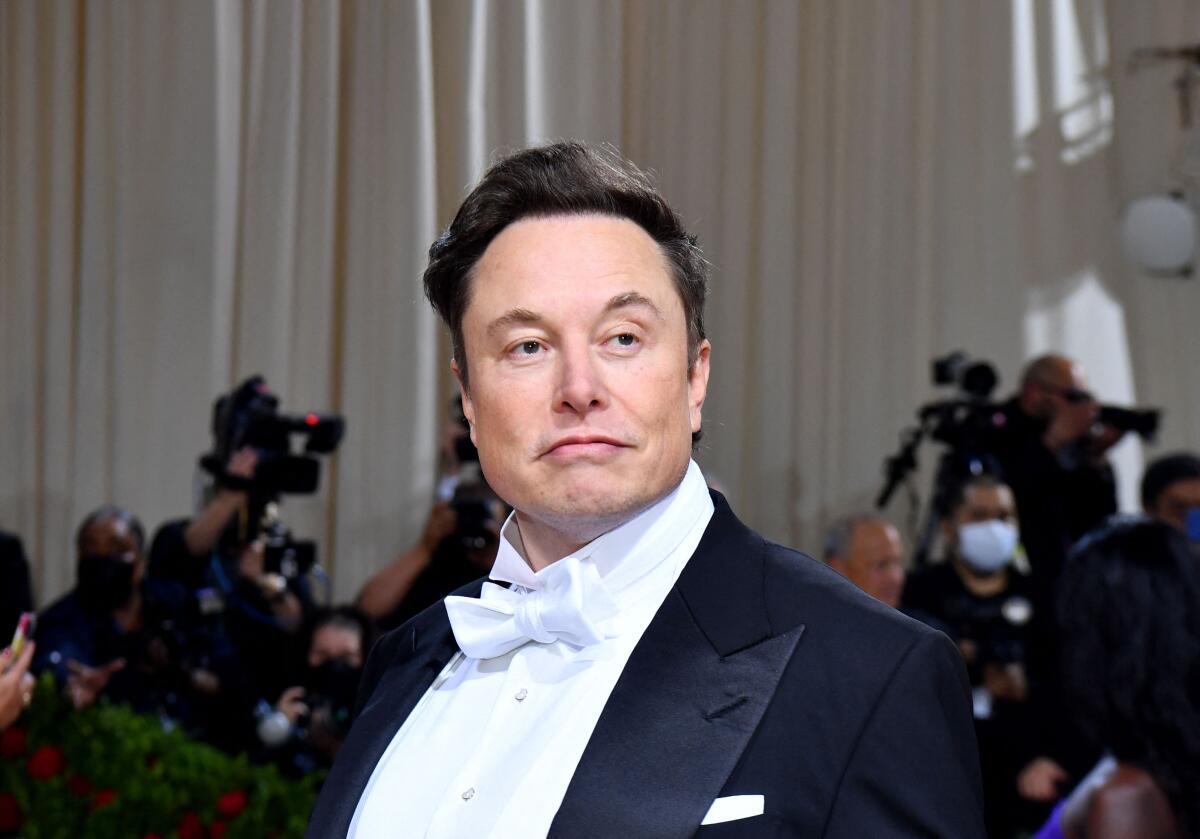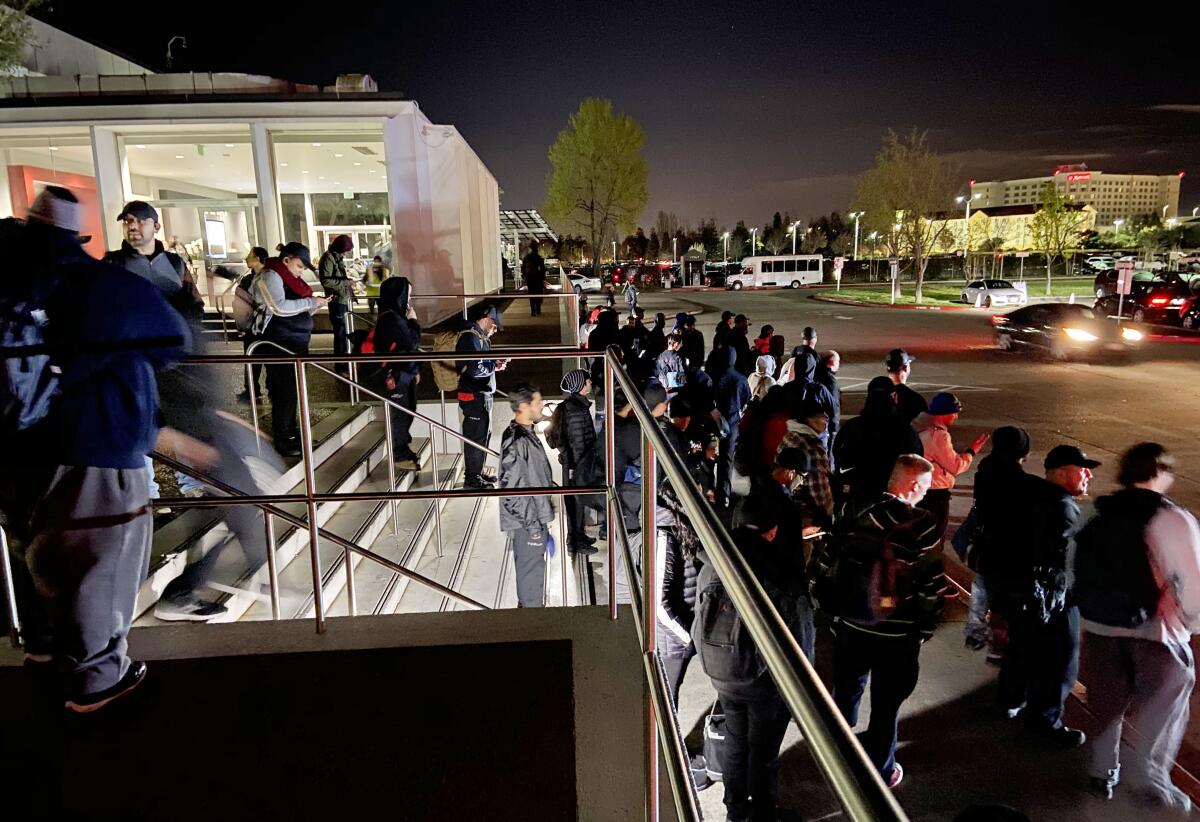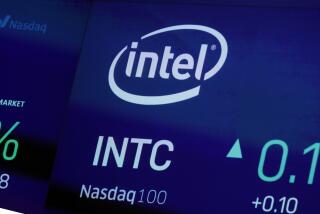Elon Musk’s ‘super bad feeling’ about the economy doesn’t mean mass layoffs are ahead

Tesla Chief Executive Elon Musk announced plans to cut 10% of the electric-car maker’s salaried workforce because he has a dire view of where the economy is headed, a projection that raised alarm on whether other companies will do the same.
Not so fast, economists say.
“Broadly, even the tech sector continues to hire, manufacturing is incredibly strong right now and consumption and business investment is strong in the U.S., even as the U.S. Fed is increasing interest rates to control inflation,” said Leo Feler, a senior economist at UCLA Anderson Forecast.
U.S. employment numbers released Friday showed the economy continues to add a healthy number of jobs. And although some sectors have seen job cuts in recent months, the moves seem to be confined for now to companies that boomed in the pandemic — for example, Peloton and Netflix — and then had to quickly adjust to curtailed revenue, or tech companies hit by slumping markets or lower valuations.
Musk sent a message to Tesla executives Thursday, according to a Reuters report, saying that he has a “super bad feeling” about the economy and that Tesla should reduce about 10% of its salaried staff, as well as pause global hiring because the company has become “overstaffed in many areas.”
In another email, Musk clarified that this “would not apply to anyone actually building cars, battery packs or installing solar” and that “hourly headcount will increase,” according to Reuters.
“The fact that he is cutting down on non-production employees is really a statement on how the company is performing in terms of efficiency rather than how the economy is doing,” Feler said.

Asked at a news conference Friday about Musk’s comments, President Biden pointed to continuing investments by Tesla’s competitors, Ford and Stellantis (formerly Fiat Chrysler), and said Ford recently announced the addition of 6,000 new union jobs in three states. “So, you know, lots of luck on his trip to the moon,” Biden said of Musk.
Still, the often-provocative words of the world’s richest man can move markets and affect corporate sentiment more broadly, and they don’t come in a vacuum. JPMorgan Chase Chief Executive Jamie Dimon told investors Wednesday to prepare for an economic “hurricane” due to interest rate increases and Russia’s war in Ukraine.
Mark Zandi, chief economist at Moody’s Analytics, said the job market has to cool down or the avalanche of new jobs and wage growth might worsen inflation.
The economy added 390,000 jobs in May, more than many analysts expected, and in line with monthly growth of about 400,000 jobs — not the typical picture for an economy many fear is at the brink of a recession.
But job growth will eventually slow, and cuts will become inevitable as businesses reassess their boom-time hiring plans.
“The jobs market is booming, but it actually has to slow down because the economy is very close to, if not already at, full employment. If it doesn’t slow, the economy will blow past full employment, inflation will become persistent and the wage growth will exacerbate high inflation,” Zandi said. Full employment is when everyone who wants to work has a job.
Employment growth should slow to about 150,000 jobs a month to reach a stable employment market, he said, and that means “we are going to hear more CEOs talk about pulling back on hiring plans, announcing a freeze or even layoffs.”
It’s not unusual that Musk is one of the first and loudest voices, Zandi said. “We should expect to hear more on this.”
Companies that have announced layoffs or hiring freezes since the beginning of the year have cited lower profits or higher costs.
In May, online car dealer Carvana said it would lay off 2,500 employees, or about 12% of its staff, and Netflix announced its second round of layoffs, of about 150 people because of a slump in subscribers and revenue. In another adjustment in the streaming market, Warner Bros. Discovery Inc. shut down the CNN+ streaming service in April, just weeks after its launch.
Cryptocurrency startups have reacted quickly to market declines. Coinbase, the exchange platform, announced a hiring freeze, and Gemini Trust, another crypto exchange, said it would lay off 10% of its workforce.
Sixty-six tech companies have had layoffs in 2022 so far, affecting more than 16,000 jobs, according to tech job tracker Layoffs.fyi. Twitter announced a hiring freeze and other cost-cutting measures weeks ago.
At Tesla, layoffs have been nearly as volatile as the company’s stock.
Musk’s first order of business after announcing he would take over as the company’s chief executive in 2008, as the financial crisis gripped the world, was to announce a round of layoffs. Subsequent layoffs related more to company issues than the greater economy.
In 2017, after Tesla bought Solar City, Musk announced he would be slashing 2% of the Tesla and Solar City workforce in what he described as performance-related firings. Many were contract workers.
In 2018, while experiencing serious manufacturing problems with the new Model 3, Musk announced that nearly 10% of the Tesla workforce would be laid off. Late in the year, he acknowledged that the company was “single digit weeks” away from bankruptcy.
Analysts expect Tesla to post weak second-quarter results next month, largely because of a weeks-long COVID closure at its Shanghai plant.
Economists expect to see an employment slowdown appear first in sectors that are particularly sensitive to high interest rates, such as housing. Several small to medium-size mortgage companies are cutting staff.
The retail sector lost 61,000 jobs in May, underscoring the continued shift in consumption patterns after pandemic restrictions eased and people ventured back out into the world.
“Slowdown in retail corresponds with what we thought consumers would do when pandemic [conditions] would ease: stop buying as much goods and instead start buying experiences, like traveling or going to entertainment venues,” Feler said.
UCLA Anderson’s latest forecast predicts the unemployment rate will inch up modestly, from 3.6% to 4.2% by mid-2023, as the pace of economic growth is expected to slow down.
“But we also expect the labor force participation to continue increasing, which would mean that the unemployment rate would partly increase as more people look for jobs, and not solely because the numbers of jobs have shrunk,” Feler said.
Times staff writers Russ Mitchell and Laurence Darmiento contributed to this report.
More to Read
Inside the business of entertainment
The Wide Shot brings you news, analysis and insights on everything from streaming wars to production — and what it all means for the future.
You may occasionally receive promotional content from the Los Angeles Times.











